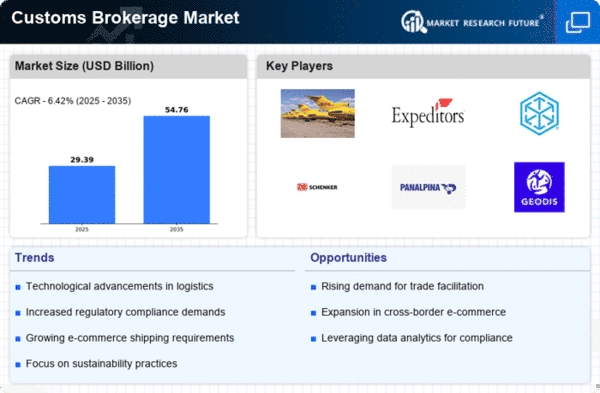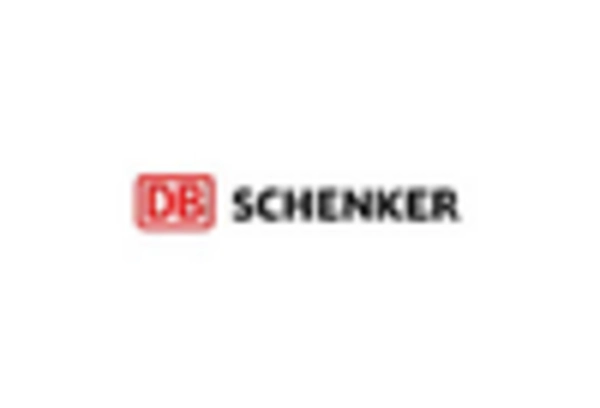Market Growth Projections
The Global Customs Brokerage Market Industry is poised for substantial growth, with projections indicating a market size of 27.6 USD Billion in 2024 and a potential increase to 57.7 USD Billion by 2035. The compound annual growth rate of 6.93% from 2025 to 2035 highlights the increasing reliance on customs brokerage services as global trade continues to expand. This growth is driven by various factors, including technological advancements, regulatory changes, and the rise of e-commerce. As businesses navigate the complexities of international trade, the demand for efficient customs brokerage solutions is expected to remain strong, shaping the future of the industry.
Increasing Global Trade Volumes
The Global Customs Brokerage Market Industry is experiencing growth driven by the increasing volumes of international trade. In 2024, the market is projected to reach 27.6 USD Billion, reflecting the rising demand for efficient customs brokerage services. As countries engage in trade agreements and expand their export-import activities, the complexity of customs regulations necessitates the expertise of customs brokers. This trend is expected to continue, with the market anticipated to grow significantly, potentially reaching 57.7 USD Billion by 2035. The compound annual growth rate of 6.93% from 2025 to 2035 indicates a robust demand for customs brokerage services in response to evolving trade dynamics.
Global Supply Chain Optimization
The optimization of global supply chains is a key driver of the Global Customs Brokerage Market Industry. As companies strive to enhance efficiency and reduce costs, they increasingly rely on customs brokers to manage the intricacies of international logistics. Effective customs brokerage services ensure timely clearance of goods, minimizing delays and associated costs. The growing emphasis on supply chain resilience and agility further underscores the importance of customs brokers in facilitating smooth operations. As businesses seek to optimize their supply chains, the demand for customs brokerage services is likely to rise, contributing to the market's anticipated growth.
E-commerce Growth and Cross-Border Trade
The rise of e-commerce has transformed the Global Customs Brokerage Market Industry, as more businesses engage in cross-border trade. The convenience of online shopping has led to an increase in international shipments, which in turn drives demand for customs brokerage services. Customs brokers facilitate the smooth movement of goods across borders, ensuring compliance with customs regulations. As e-commerce continues to expand, particularly in emerging markets, the need for efficient customs brokerage solutions becomes paramount. This trend is expected to bolster the market, as businesses increasingly rely on customs brokers to navigate the complexities of international shipping.
Regulatory Changes and Compliance Requirements
The Global Customs Brokerage Market Industry is significantly influenced by regulatory changes and compliance requirements. Governments worldwide are continuously updating customs regulations to enhance security and facilitate trade. Customs brokers play a crucial role in ensuring that businesses comply with these regulations, which can vary by country and region. The increasing complexity of these requirements necessitates the expertise of customs brokers, who help navigate the regulatory landscape. As businesses seek to avoid penalties and delays, the demand for customs brokerage services is likely to rise, contributing to the overall growth of the market in the coming years.
Technological Advancements in Customs Processes
Technological innovations are reshaping the Global Customs Brokerage Market Industry, enhancing efficiency and compliance. The integration of advanced software solutions, such as automated customs declaration systems and blockchain technology, streamlines the customs clearance process. These technologies reduce processing times and minimize errors, thereby improving overall operational efficiency. As customs brokers adopt these innovations, they can better manage the complexities of international trade regulations. This trend is likely to attract more businesses seeking reliable customs brokerage services, further driving market growth. The ongoing digital transformation within the industry suggests a promising future for customs brokerage as technology continues to evolve.
















